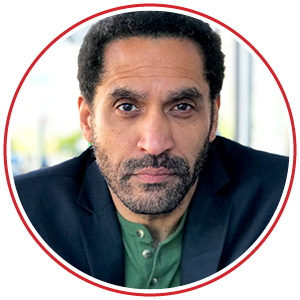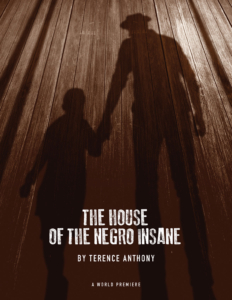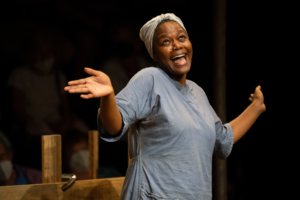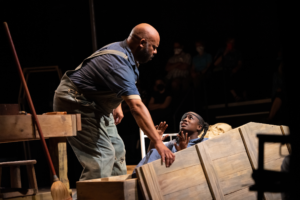PLAYWRIGHT INTERVIEWS
Interviews conducted and edited by Colin McGuire.
Of all the plays produced during this installment of the Contemporary American Theater Festival, The House of the Negro Insane has perhaps the most storied history with the event. The COVID-19 pandemic delayed the play ultimately coming to CATF since 2020. As a result, festival organizers held a handful of events featuring the play in the interim, at one point even produced an audio-only performance of the story that featured a Q&A with playwright Terence Anthony. That changes this season when the world premiere finally hits the CATF stage in the flesh, and Anthony, for one, couldn’t be more excited to see his labor of love come to life. “I think this is definitely the best play I’ve written so far,” he said during a recent interview with CATF. “It’s the one that I’ve worked on the longest in my limited playwright career. It’s also the one I’m most invested in artistically and emotionally.” Anthony had a lot more to say about not only the play, but receiving praise, writing for television and a slew of other topics. The following is the text of the full conversation between CATF and the playwright:
I have heard so much about your play for the last year or two. Everybody has fallen in love with it and it seems like people can’t say enough good things about it. Have you heard any of that feedback, too? And what is it about the story and play that you think is really connecting with people?
It’s hard for me because I’m always very surprised to get positive feedback. I usually only see the things I want to change or improve or rewrite. So, it’s always hard for me to say why somebody likes something I do [laughs], but it has been pretty surprising, some of the positive feedback I’ve gotten about the play. Even when it was in development workshops, the public readings were pretty overwhelmingly positive. I think people are kind of surprised when they do see it, given the subject matter. They go in, thinking it’s going to be something that is less entertaining and less uplifting, and I think that may be a factor, but honestly, I’m always shocked when somebody is happy with something I put out.
Can you take me through the genesis of the idea for the play? How did everything come about?
I started writing the play about seven years ago. I had read a book about the first immortal cell line taken from Henrietta Lacks, an African-American woman whose cells were harvested without her consent. In the book, there’s a chapter where the author of the bookend Henrietta’s granddaughter investigate what happened to one of Henrietta’s daughters who happened to be committed to the Crownsville Hospital for the Negro Insane in Maryland and died there in 1955 or so. I had never heard of Crownsville or any hospitals specifically for Black folks during that time, so I started researching and found out that Crownsville was one of a number of hospitals that were built, starting in the early 1900s, specifically for quote-unquote insane or idiotic negroes. The more I researched, the more I wanted to do a play that explored what those institutions were, what they represented at that time. The play sort of grew out of that desire.
Is this the first time you’ve worked with CATF?
It is, but it feels like we’ve been working together for a long time. Well, we have been working together for a long time. The play was supposed to go up in 2020 and got postponed. CATF has been amazing to work with because they didn’t cancel it and said the festival will go on, and it’s just going to be postponed because of the pandemic. They did sneak previews, where they recorded little scenes from the plays. They talked to not only the playwrights, but the designers and artists associated with the productions. Last year, they produced an audio-drama of the play and they’ve been great about staying in touch and continuing to support the piece and the playwrights. So, yeah, this is the first time, but it feels like we’ve been working together for a very long time, and I hope it won’t be the last time because they are very amazing to work with.
Has the play changed at all since the audio-drama, say, within the last year?
Yeah, it has some. I’m always tweaking dialogue. I streamlined a few things, made some sort of staging changes because it’s going to be in the round at CATF and I had written it with a different stage in mind. So, there’s some tweaks that needed to happen, but there haven’t been substantial or large structural changes to the play. It’s been a lot of smaller things.
You had mentioned how you researched a lot of this stuff and that served as the inspiration for the play. Is that something you do a lot? Do you like to go back and get historical information and base a story off of that? Is this the first time you tried that? What’s your typical approach?
I wouldn’t say I have a typical approach. It’s more like whatever … I’m always taking notes. I try to read a good amount of history. I’ll read a fiction book and then I’ll read a historic novel or a nonfiction novel to try and switch it up whenever I’m reading anything. It really comes down to what ideas catch my attention and pieces of history that I’m unaware of and feel like other folks are unaware of — those are the things that really stick with me. I’ll mull on that and take a lot of notes and research more stuff. Whatever sticks and continues to develop, and if it’s something I’m able to come at sideways, I think that’s usually what has turned into a play or a creative project for me. I’m most interested in doing stuff that is unexpected as opposed to something that is more of a docu-fiction approach or something that’s sort of head on in tackling subjects. Sometimes, it means I take inspiration from what I researched and do a sci-fi inspired story. The House of Negro Insane is the first play that I’ve done that’s set in this specific time period in the past.
Was there anything about it that surprised you as it came together? Was there anything that you didn’t see coming, but once it revealed itself to you, you thought it was an interesting wrinkle for the story?
I think the most surprising thing was the relationship between the protagonist and Henry, the White person who is the obstacle for the other characters in the play. The way their relationship develops and sort of becomes more and more complicated and unexpected … as I got to know their relationship better, I think their relationship really became a thing I wasn’t expecting when I started writing the play.
At the end of the day, where does this play sit with you among your other work?
I think this is definitely the best play I’ve written so far, which may be a low bar, but it’s the one that I’ve worked on the longest in my limited playwright career. It’s also the one I’m most invested in artistically and emotionally. It’s the one I’m most proud of at this point.
One of the taglines each year for CATF is thinktheater. Do you think this play has thinktheater in it? Do you hope it sparks debate or conversation among people?
Yeah, I think it definitely has that. I get more and more reluctant the more I talk about what kind of conversations I want people to have coming out of it because I think the work speaks for itself. I think it’s something that I want people to come out of really inspired to buy it as a piece of art, but also be able to take the play and the characters back into the world with them in some way. I’m looking forward to what the conversations are and the different ways people experience the play, so I always want people to go in without a road map of what they think I want them to get out of it.
Are you going to be on the East Coast for any of it?
Yeah, I’ll be there opening weekend.
Are you nervous?
Not nervous. I’m knocking on wood every chance I get, not only just for the play to go over well with folks, but to make sure everyone working on the play stays safe and healthy. These days, it’s even more of an amazing feat to be putting on something like this. I’m always thinking of everybody working hard on this and I’m hoping everybody gets through it OK.
After this run, what’s next for you?
The play is going to go on to the National Black Theater Festival in Winston-Salem in August with CATF, which is really exciting. Then, whatever else comes up for it, I’m hoping it will live on. I’m working on a couple other plays — another historic one that has been my development focus and then I’ve been lucky enough to start writing for TV. I’ve been working on a new TV series since late last year, so I’ll hopefully be working on more TV projects in the near future. The project is pretty much green lit now. It’s going to be on Paramount Plus. They’re marketing it as a spinoff of the 1883 series that was on last year and it focuses on Bass Reeves. I’m really looking forward to it.




